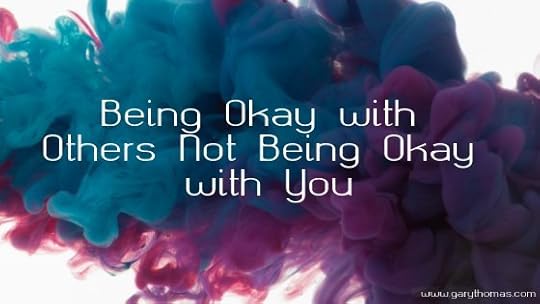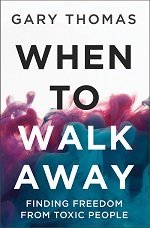Being Okay with Others Not Being Okay with You

Historically,
I’ve been rather weak in this regard. I hate it when people aren’t okay with
me. Even toxic people. That weakness gives them a power they don’t deserve and
potential control that they love to exploit.
I
got a cryptic request from a lawyer recently who asked me who some of my
favorite classical writers were. I sent him a list, and then he explained he
was reviewing Sacred Marriage to see if it was “acceptable” for his
church to read. His requests were part of his process of looking for ammunition
and “suspect sources” that I rely on.
This
lawyer was suspicious that no one “famous” had endorsed Sacred Marriage,
but when the book first came out 19 years ago the publisher didn’t seek any
endorsements (I don’t remember why). He then followed up with an email about his
conclusions: my book had “many fine quotes” but was troublesome and likely even
blasphemous. He was writing a review and wondered if I would talk.
If
you want freedom from toxic people, you have to learn how to be okay with
others not being okay with you.
Perhaps
foolishly, I agreed, but it wasn’t really a discussion. I was dumb founded by
how petty many of his criticisms were and how confident he was in his
small-mindedness. He was deeply offended that I called Fenelon a “Christian”
because Fenelon was born after Calvin and didn’t become a Calvinist. He was
gravely concerned that in the book I mentioned how my wife read Guideposts magazine
(which had been a gift subscription from my mom), and even though I say in my
book that Guideposts (which was, he informed me, founded by Norman
Vincent Peale) isn’t really the kind of thing I read, he wanted me to know that
many Christians would be asking “Why is Gary letting his wife read Guideposts?”
The audacity of this question, why I would let my wife read Guideposts,
paints a picture of marriage that is completely foreign to me. And, among
many other things, he was deeply troubled by my recounting of Leslie’s story in
Sacred Marriage. After being cheated on and abandoned by her husband,
and left with minimal financial resources, Leslie saw a beautiful Easter lily
and said in a short prayer to God that she would love one of those. She didn’t
have the money to buy one, but the very next day someone left one on her desk,
which Leslie received as a gift from God. “That’s mysticism!” my
lawyer-critic challenged.
I
could see we weren’t going to get very far so I mostly listened, sometimes even
laughing (not intentionally or trying to be mean; the laughs sprang from genuine
puzzlements) when he made another point that astonished me. Some other comments
were more substantive, of course, but it was difficult to keep up.
When
his review was finished and (surprise, surprise) his conclusion was reached
that it still wouldn’t be “safe” for most people in his church to read Sacred
Marriage he wanted me to react point by point to his critique after he sent
it to me. I declined. He wrote a couple more times, saying all I had to do was
write “agree” or “disagree” with every assertion. I’ve found that toxic people
don’t like to give up. They don’t like the word “no.” They still want another
piece of your time.
I
think he may have been bothered that I told him I was praying God would bless
him with humility—not in a mean or snarky way, but as a genuine blessing.
Still, it was difficult for me not to respond, and his attacks kept coming back
to my mind because I know he’s going to post the review and I know that people in
his church will be told it’s not safe to read Sacred Marriage. It took a
couple days for me to “mentally” walk away. I can still be rather weak in this
regard. My publisher told me that we should reach one million copies sold in
October. One lawyer’s review among the hundreds that have been published, and
one church putting it on the “forbidden” list won’t define it, but I can be so
weak, it still troubled me.
In
the midst of my weakness, here’s what I’ve learned: you can’t please toxic
people without hurting or offending the faithful. Toxic people force you to
choose. To make them happy is to often grieve God and wound others. To please him,
I’d have to demand that my wife not read Guideposts (she hasn’t for decades,
but not because I don’t “let” her). I’d have to tell Leslie it’s inappropriate
to believe that God provided her with that Easter lily. And I’d have to tell
others it’s not “safe” to read anyone who didn’t become a Calvinist or agree
with Calvin if they were born in or after the sixteenth century. (For the
record, I also quote John Calvin approvingly in Sacred Marriage, as well
as John Owen, who systematized Calvinism. My theological mentor in seminary—and
the person whom I currently read as much as anyone else—was none other than Dr.
J.I. Packer. I just don’t restrict my reading—or quoting—to Calvinists.)
To
be a healthy person is to have the courage to let toxic people oppose you, hate
you, and say awful things about you.
In
When to Walk Away I have an entire chapter on Nehemiah, who brilliantly
sidestepped many toxic challenges. The chapter was getting too long so I had to
cut it considerably, and one thing I don’t point out in the book is the selfish
side of Tobiah’s attack against Nehemiah. Tobiah was enmeshed in Jerusalem’s
social and political establishment. He could both request and grant favors, the
kind of guy that contemporary people would say exists in Washington D.C.’s “swamp.”
One of these favors (J.I. Packer addresses this in his book A Passion for
Faithfulness, and I’m leaning on his insights here) was getting a temple
storeroom reserved for his personal possessions. Eliashib, the high priest in
charge of the temple, allowed Tobiah to take over this part of the temple. It
was supposed to be reserved for offerings and sacred purposes, but Eliashib allowed
Tobiah to use it as a personal storehouse.
When
Nehemiah found out about this, he personally threw all of Tobiah’s goods out of
the storeroom and into the street (Neh. 13:8). The language makes it sound like
Nehemiah did this personally, and the verb used literally means “threw.” This
wasn’t a polite repositioning; it probably looked more like a reality show
altercation.
Imagine
Tobiah’s fury! He had been getting a free deal but now his personal control
over God’s temple was over. For Nehemiah to placate Tobiah, he’d have to accept
the selfish misuse of God’s temple. Nehemiah chose to please God; “I put back
into [the storerooms Tobiah had taken over] the equipment of the house of God,
with the grain offerings and the incense” (Nehemiah 13:9).
Taking
time trying to please a toxic person will keep you from using that time to
invest in healthy relationships and discipling reliable people. Don’t divert
healthy possessions, time, thoughts or mental energy trying to make a toxic
person feel a little better about you. You can’t do that without taking that
time and energy away from a more worthwhile pursuit.
Value your time. Toxic people won’t. I’ve learned
that they will keep sending emails until I finally don’t even respond anymore. It
feels rude to me to stop responding, but their arrogant demands are also rude.
Normal people can accept a “no thank you.” Toxic people usually won’t.
One
of the verses that I write about in When to Walk Away, a verse that has
become a new daily encouragement for me, is the very last verse of Nehemiah
(13:31), when Nehemiah prays “Remember me with favor my God.” I want to
be remembered with favor by God. It doesn’t matter what an Amazon reviewer
says. It doesn’t matter what people say on Facebook or Twitter. It doesn’t
matter what a proud lawyer thinks.

What
matters for me and for you is how God views what we are doing. Other church
members may bad mouth you. An ex-spouse may pummel your reputation. Perhaps
even your children or parents will hold you in contempt. That’s always
unfortunate and hurtful. But sometimes, to be remembered with favor by God
means being held in contempt by toxic people. And that’s okay.
It’s
a mark of spiritual maturity when we can learn how to be okay with others not
being okay with us.
Want to begin reading a pre-release copy of When to Walk Away today? You can, if you join the When to Walk Away launch team. Click here for more info!
The post Being Okay with Others Not Being Okay with You appeared first on Gary Thomas.



